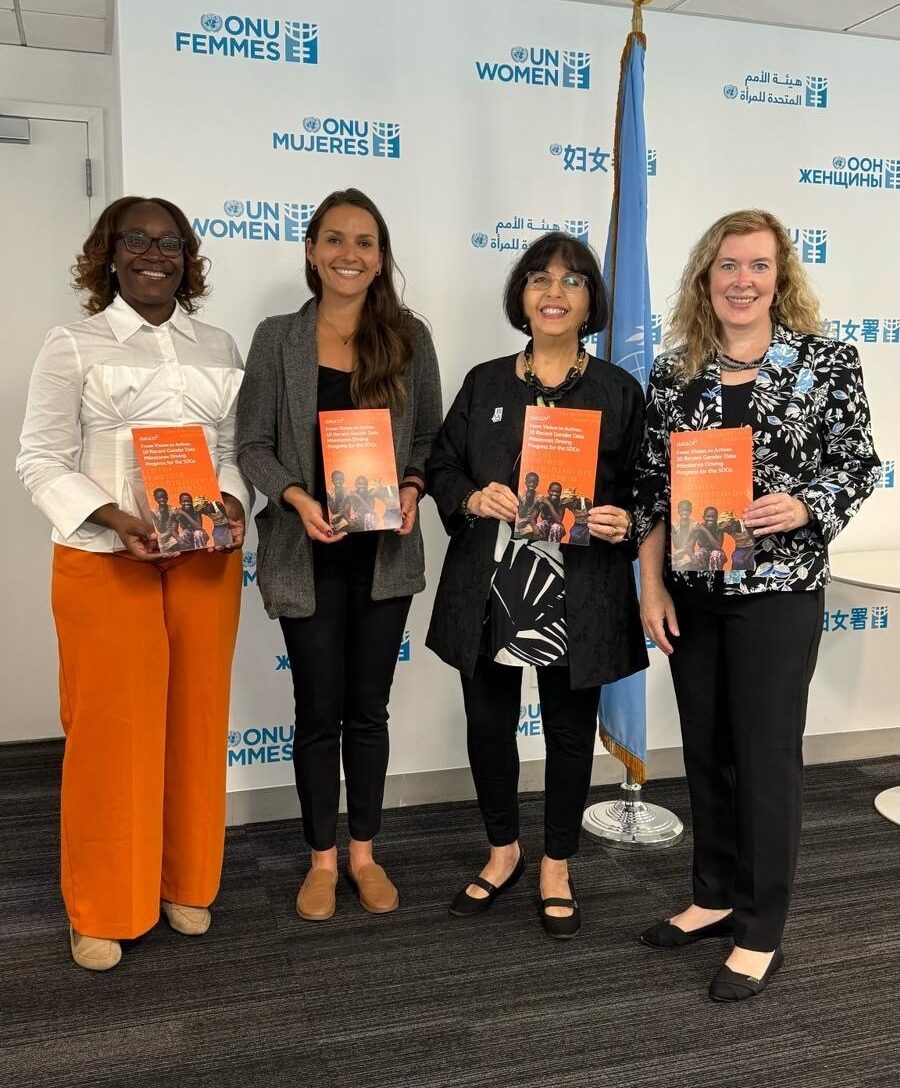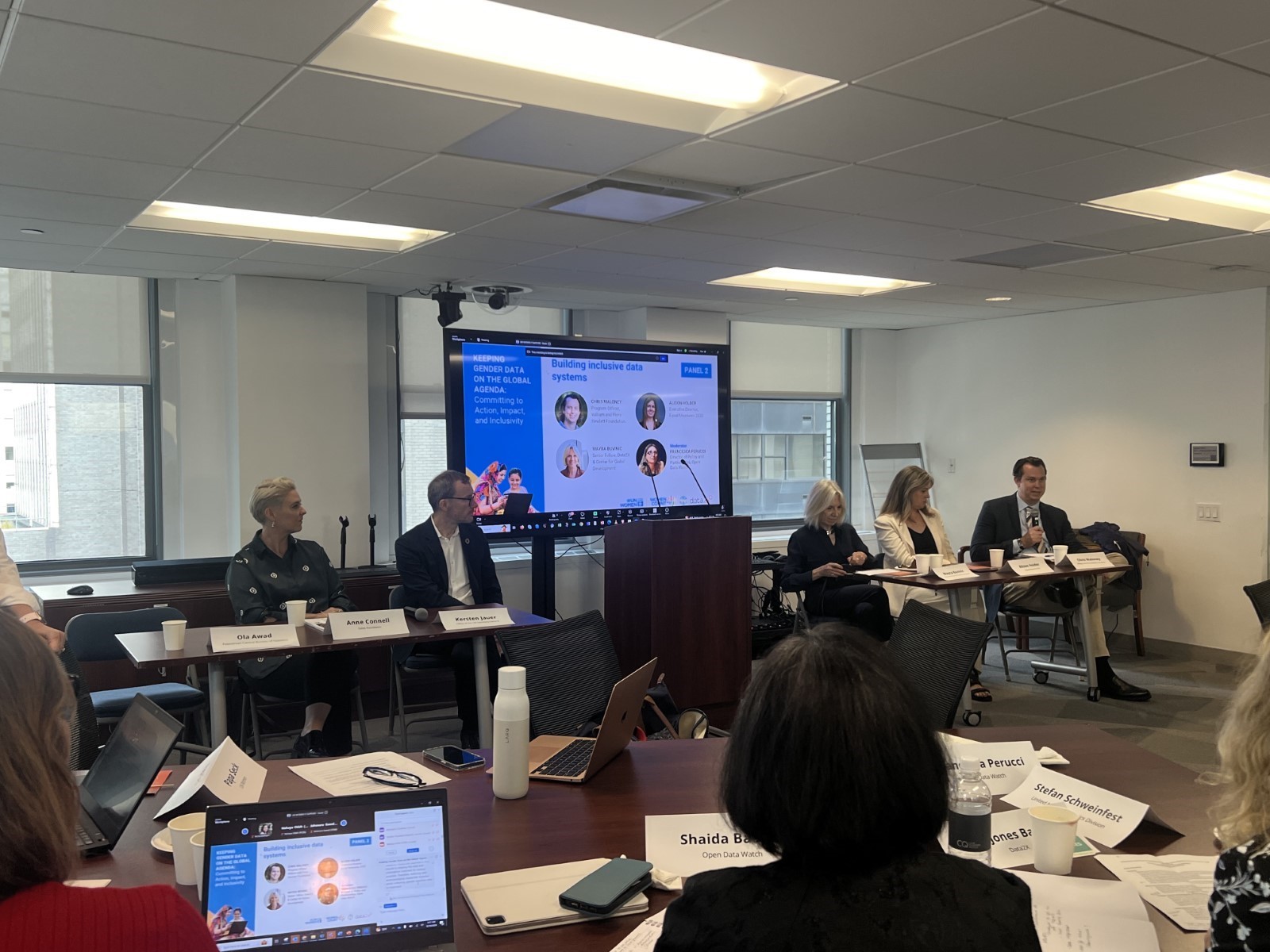Keeping Gender Data on the Global Agenda:
Committing to Action, Impact, and Inclusivity
By Deirdre Appel and Raquel Fontes
A special event during this year’s UN General Assembly stressed the urgent need to keep gender data at the forefront of global conversations. The event, Keeping Gender Data on the Global Agenda: Committing to Action, Impact, and Inclusivity, organized on 19 September by UN Women, Open Data Watch (ODW), and Data2X, gathered experts to discuss how to strengthen coordinated action to bridge persistent gender data gaps and push forward the commitments required to support gender equality.
Stefan Schweinfest, Director of the UN Statistics Division, opened the event by addressing the critical shortage of gender data despite increased attention over the years. While progress has been made, many countries still lack 44 percent of the necessary data to monitor gender-related Sustainable Development Goals (SDGs). Schweinfest called for a collective effort, encouraging stakeholders to support the UN World Data Forum Commit to Data campaign ahead of the fifth UNWDF in Medellín this November. “The gender gap in data is still critical as it faces severe data limitations…I’m asking everybody to look at [the campaign] and think about it. What can be your commitment and contribution?”
Two commitments were presented during the event:
- Towards Better and More Efficient Gender Data Support to LMICs: A New Gender Data Collaborative : Data2X is bringing together partners to harmonize gender data tools and services provided to countries. This effort aims to improve coordination and enhance national capacity for gender data systems. By uniting expertise, the collaborative is paving the way for more effective and impactful gender data initiatives, ensuring that data-driven policies better address the needs and realities of women and girls worldwide.
- Building data systems for all: Facilitating intersectional data collection, analysis, and use to leave no one behind: Open Data Watch and Data2X are leading an effort to develop a collaborative to facilitate sustained collaboration and manage innovative research to overcome existing barriers and harness the full potential of intersectional data.
The conversation highlighted both the challenges and opportunities in strengthening gender data systems globally. Shaida Badiee of Open Data Watch drew our attention to the numerous achievements made in the gender data space since the start of the SDGs. Jessamyn Encarnacion of UN Women pointed out that, while efforts to collect and analyze gender data have increased, countries are still missing nearly half of the data required to fully track progress on gender-related SDGs. She emphasized that political momentum, partnerships, and concrete commitments are essential to accelerate progress toward gender equality.

Alison Holder of Equal Measures 2030 added that addressing the gender data gaps requires not only technical solutions but also a shift in how data is used to advocate for policy changes. Holder shared the challenges of developing the SDG Gender Index, noting the gaps in disaggregated data on sensitive issues like gender-based violence and unpaid care work. Anne Connell of the Gates Foundation also highlighted successes, one of which was heard during the recent Women in Data Summit in Kenya, where gender data influenced the development of national care needs assessments and gender sector statistical plans.
Intersectional data was also a central focus, with Mayra Buvinic from Data2X emphasizing that without intersectional data, it is impossible to fully understand the experiences and challenges faced by marginalized groups, including indigenous women and girls. Buvinic stressed the importance of inclusive data systems that reflect the diversity of experiences across gender, race, ethnicity, and other identity factors.

Panelists gather to discuss the actions needed to ensure gender and inclusive data stays on the global agenda.
The event concluded with a strong call to action. Krista Baptista of Data2X encouraged participants to carry the momentum forward to the UN World Data Forum, where the Commit to Data campaign will continue to push for concrete actions and impactful commitments. “We have an opportunity to harness the energy and enthusiasm we’ve seen today and translate it into real progress in Medellín and beyond. Now is the time for action.”
As the global community moves toward the UN World Data Forum, stakeholders are urged to make commitments through the Commit to Data campaign, ensuring that gender data remains a priority for achieving the SDGs and leaving no one behind.
Call to Action:
- Register for the UN World Data Forum
- Join the Commit to Data Campaign
- Explore UN Women’s Gender Snapshot, Equal Measures 2030’s SDG Gender Index, Data2x and Open Data Watch’s Intersectionality in Development Data brief, and CRAF’d open call for gender data in crises







